Meal Prep For Work Soup Recipes For Cold Days
Discover nourishing meal prep for work soup recipes to warm up on cold days. Get our top picks for easy, healthy meal prep ideas.
What if your lunch could warm you up before the microwave finishes? As temperatures drop, a steaming container of homemade soup becomes more than food—it’s a midday reset. Let’s face it: balancing flavor, nutrition, and time during busy weeks feels like solving a puzzle. But here’s the secret—your freezer and a sturdy pot can transform this challenge into a no-stress routine.
I’ve spent years testing batch-friendly broths and chilis that hold up beautifully in lunch containers. My favorite black bean version started as a thrown-together experiment (and even my pickiest kid approved). That’s the beauty of soups—they’re forgiving, adaptable, and perfect for making ahead. Freeze individual portions in reusable cubes or jars, and you’ve got instant warmth all week.
Key Takeaways
- Soups turn meal planning into a streamlined system, not a daily chore
- Freezer-friendly batches adapt to shifting schedules and tastes
This week, we’ll explore hearty combinations that reheat flawlessly and keep you fueled. You’ll find smart storage tricks, time-saving shortcuts, and ways to layer flavors without extra effort. Because nourishing yourself shouldn’t feel like another item on your to-do list.
Soup Season and Meal Prep
When frost paints the windows, your lunchbox deserves a hug in a bowl. This time of year isn’t just about scarves and snow—it’s when simmering pots become your kitchen’s best friend. Let’s talk about turning that midday break into a moment of comfort without the chaos.
Setting the Stage for Cozy Work Lunches
Ever notice how a steaming container changes your office vibe? Studies from The Kitchn show warm foods boost focus better than cold sandwiches. My go-to move: ladling Sunday’s big-batch creations into portioned jars. Try a golden potato-kale blend topped with crispy garlic bits—it reheats like a dream and keeps you satisfied through afternoon meetings.

Why Soup Reigns Supreme in Cold Weather
Broths and stews aren’t just practical—they’re alive. Flavors deepen overnight, transforming “leftovers” into something richer. Take stuffed pepper soup: day one tastes good, but day three? The tomatoes and spices become best friends. Top it with avocado slices or a sprinkle of sharp cheddar for that fresh-bowls-every-time magic.
| Soup Type | Prep Time | Flavor Boosters | Freezer Life |
|---|---|---|---|
| Creamy Tomato | 40 mins | Basil, Parmesan | 3 months |
| Spicy Black Bean | 55 mins | Lime, Cilantro | 4 months |
| Chicken & Wild Rice | 60 mins | Thyme, Lemon Zest | 2 months |
Here’s the truth: your future self will high-five you for that freezer stash. Whether it’s -10° outside or your schedule’s packed, a jar of warmth waits patiently. What’ll be in yours this week?
Benefits of Meal Prep for Work Soup Recipes
Imagine your lunchbox delivering a steady stream of energy while colleagues nibble sad desk salads. That’s the power of strategic broth-based planning. I learned this after burning out on chopping veggies nightly—now my Sunday pot does the heavy lifting.
Nutritional Advantages to Keep You Energized
Batch-cooked broths become nutrient goldmines. Think shredded chicken mingling with carrots and kale in a chicken noodle base—each spoonful packs protein, fiber, and vitamins. Practical strategies show even 30-minute simmer sessions yield better results than grab-and-go options.
Here’s what thrills me: control. When crafting beef stew, I adjust salt levels and swap russet potatoes for sweet ones. You’re not just reheating—you’re curating a balanced blend of textures and nutrients that fast food can’t touch.
- Proteins stay tender when cooked low and slow
- Veggies retain crunch if added late in the process
- Homemade broth skips preservatives found in canned versions
My intern proved this last month. She started packing mason jars of lentil-turmeric blend, reporting fewer 3pm slumps. “It’s like edible caffeine,” she laughed. For spicy twists, stir in chili flakes or ginger pre-freeze.
Truth? You don’t need elaborate recipes. Roast leftover veggies Sunday night, simmer with stock Monday morning—boom. Five weekday lunches with more vitality than a $12 chopped kale salad.
Choosing the Right Soup Recipes for Cold Days
Your kitchen becomes a flavor playground when temperatures dip. The secret? Treat recipes as flexible frameworks, not rigid rules. I once turned a basic tomato broth into three distinct batches—one with sausage for my husband, a vegan lentil version for my sister, and a creamy squash blend for my neighbor’s gluten-free diet.
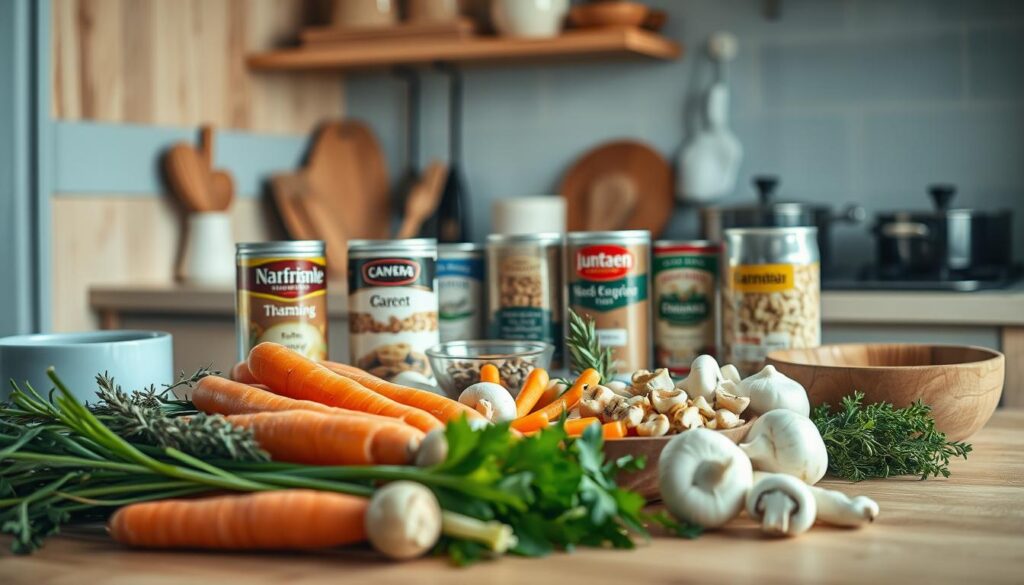
Customizing Flavors and Ingredients
Start with what’s in your fridge. That half-used bag of spinach? Toss it in. Leftover roasted chicken? Shred it. Soups thrive on improvisation. My rule: one base + two veggies + one protein + one flavor hero (like smoked paprika or fresh herbs).
| Base Recipe | Customization Options | Flavor Twist | Prep Time |
|---|---|---|---|
| Tomato Basil | Add white beans or ground turkey | Basil pesto swirl | 35 mins |
| Butternut Squash | Swap coconut milk for cream | Toasted pepitas | 45 mins |
| Chicken & Quinoa | Use kale instead of spinach | Lemon zest finish | 50 mins |
Balancing Health and Heartiness
Rich doesn’t mean heavy. For my go-to vegetable soup, I roast squash to deepen its sweetness without added sugar. A squeeze of citrus brightens broths, while Greek yogurt adds creaminess minus the calories.
Last week, a reader emailed: “My kids hate ‘green things’.” Solution? Blend wilted kale into a tomato base—they’ll never know. Remember: every ingredient serves a purpose. Spices boost metabolism. Proteins keep you full. Broths hydrate. Your recipe becomes nourishment, not just food.
Meal Prep for Work Soup Recipes: Innovative Ideas
Ever stare at your lunch container and think, “Didn’t I just eat this yesterday?” Let’s flip the script. Last winter, I turned leftover roasted veggies into three wildly different batches—a smoky chili, a tangy minestrone, and a creamy coconut curry. The secret? Treat your base recipe like a blank canvas.
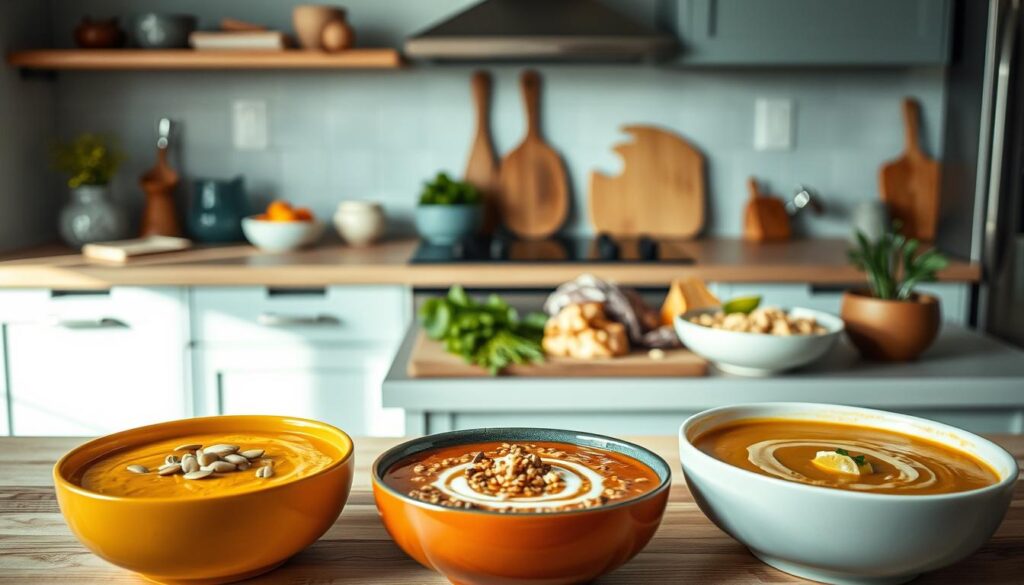
Start with layering flavors. Simmer caramelized onions or roasted garlic into broths for depth. Try swirling pesto into tomato bases or adding a spoonful of miso to chicken stock. One reader told me, “Mixing mushroom broth with butternut squash puree felt like discovering a new food group.”
Here’s where cooking gets fun:
- Freeze herb-infused ice cubes (basil + olive oil) to revive flavors at lunchtime
- Top jars with crispy toppings separately—think toasted nuts or fried shallots
- Blend two leftover batches into a “soup mashup” (my broccoli cheddar + turkey chili combo was a hit)
Document your experiments. My notebook’s filled with notes like “Add lemon zest to lentil next time” or “Swap paprika for chipotle.” Even basic recipes become springboards—a simple potato leek blend can evolve into loaded baked potato style with bacon bits and chives.
Pro tip: Keep portions diverse. Pack one spicy jar and one mild. Alternate creamy and brothy textures. A bit of variety keeps taste buds curious, turning midday breaks into adventures instead of routines.
Omnivore, Vegetarian, and Vegan Soup Options
Your midday break shouldn’t require a dietary compromise. Last winter, a reader emailed: “My partner eats meat—I don’t. How do we share freezer space?” The answer lies in smart ingredient swaps that keep everyone satisfied. Let’s break down how one base recipe can branch into three delicious directions.
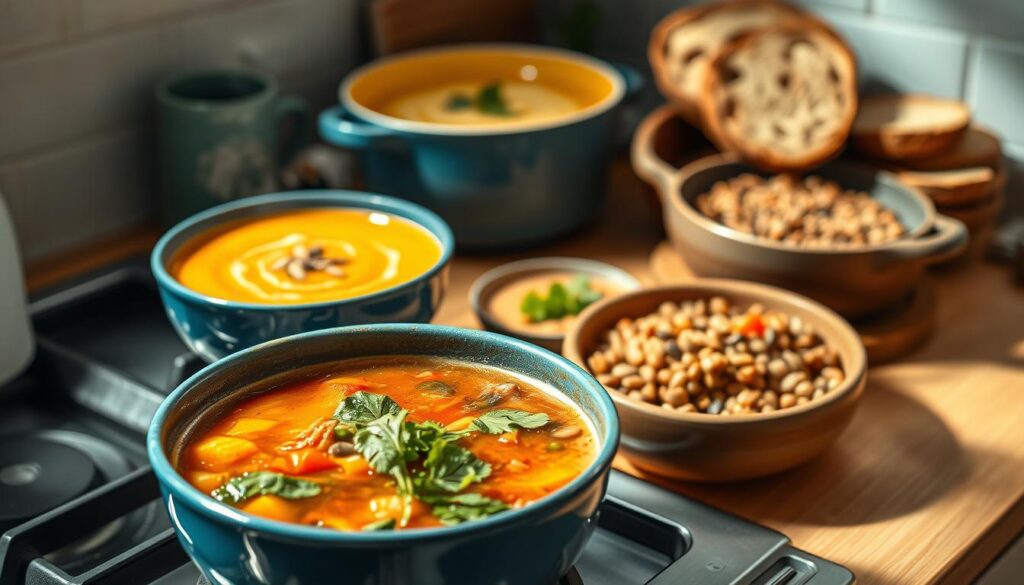
Diverse Protein and Vegetable Combinations
Proteins anchor any broth-based creation. For omnivores, shredded chicken adds heartiness without overpowering. Vegetarians? White beans or lentils bring earthy depth. Vegan versions shine with marinated tofu or tempeh crumbles. Here’s the magic: start with the same aromatic base (think onions, garlic, celery), then split the batch.
| Protein Type | Easy Swaps | Vegetable Pairings |
|---|---|---|
| Chicken | Shredded turkey, pork | Carrots, peas, spinach |
| Beans | Lentils, chickpeas | Kale, zucchini, mushrooms |
| Plant-Based | Tempeh, seitan | Bell peppers, bok choy |
Noodle soup lovers, rejoice! Swap egg noodles for zucchini spirals in vegan versions, or use whole-grain pasta for extra fiber. A client once transformed my chicken tortilla recipe by using black beans and jackfruit—it became their office favorite.
- Freeze proteins separately for last-minute additions
- Roast veggies beforehand to intensify flavors
- Store broths plain, then customize during reheating
Balance textures by keeping some ingredients crisp. Try adding snap peas or water chestnuts just before serving. One trick I love: drop frozen edamame into hot broth—they thaw perfectly by lunchtime.
Incorporating Seasonal Ingredients and Bold Flavors
Ever noticed how a simple garnish can turn Monday’s lunch into a Friday treat? Seasonal cooking isn’t about fancy techniques—it’s working smarter with what’s already vibrant. Last November, I transformed overripe pears into a ginger-kissed bisque that made my carpool crew beg for the recipe.

Fresh Herbs, Spices, and Seasonal Produce
Your market’s rotation is your flavor playground. Summer zucchini brightens broths with grassy notes, while winter squash adds natural sweetness. Roast vegetables when they’re peak-ripe—their caramelized edges deepen broths without extra salt or fat.
Don’t underestimate fresh herbs. A $3 basil plant yields weeks of aromatic punches. Freeze chopped herbs in olive oil cubes for instant flavor bursts. One reader shared: “Thyme ice cubes revived my Thursday chicken broth better than any bouillon.”
Enhancing Taste with Creative Garnishes
The magic happens in the final drizzle. Keep these mix-ins ready:
- Crumbled feta or sharp cheddar cheese
- A swirl of coconut cream or Greek yogurt
- Toasted seeds tossed with smoked paprika
My favorite way to revive leftovers? Squeeze citrus over chilled portions before reheating. That bit of acidity cuts through richness like a pro chef’s tweak.
Remember—there’s always a way to make it yours. Swap garnishes based on moods or pantry finds. As my neighbor says: “Your bowl, your rules.” What way will you elevate tomorrow’s lunch?
Meal Prep Techniques and Time-Saving Tips
What if your Sunday pot could fuel your entire week? After burning three batches of chili in my early days, I discovered smarter approaches that balance flavor and efficiency. Let’s transform chaotic kitchen sessions into streamlined systems.
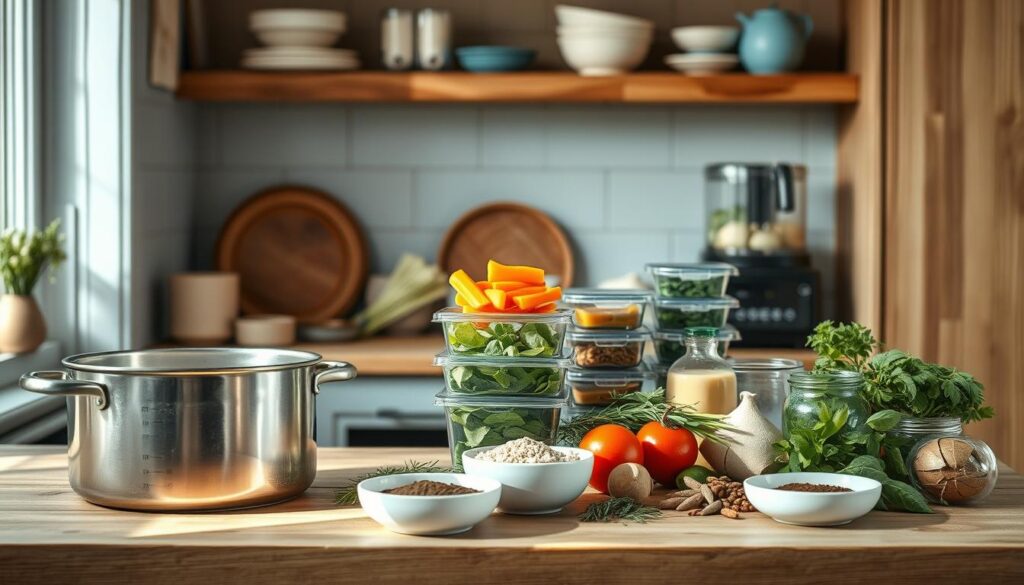
Efficient Batch Cooking Strategies
Start with aromatics. Sauté onions and garlic in your largest pot—this base works for multiple recipes. As Half-Baked Harvest’s Tieghan Gerard advises: “Roast veggies while simmering broth. Multitasking cuts active time by 40 minutes.” Use an immersion blender to puree half the batch for creamy textures, leaving the rest chunky.
| Method | Time Saved | Best For | Tools |
|---|---|---|---|
| Double Batch | 90 mins/week | Freezer-friendly bases | 8-qt pot |
| Prep Station | 25 mins | Chopping veggies | Food processor |
| Layered Cooking | 30 mins | Grains + proteins | Pressure cooker |
Smart Freezer Organization Methods
Label everything. My Souper Cubes live on the freezer’s top shelf—each cube holds one portion. Stack trays vertically like files for easy access. Pro tip: Freeze broths flat in gallon bags. They thaw faster and fit behind juice boxes.
Revive flavors before reheating. Drop a frozen herb cube into chilled soup portions. The ice melts during microwaving, releasing fresh basil or cilantro notes. Your future self will thank you when Wednesday’s lunch tastes like it just left the stove.
Maximizing Soup Freshness: Storage and Reheating Tips
Nothing deflates lunchtime joy faster than soggy veggies or separated broth. Through trial and error (and a few freezer disasters), I’ve nailed methods that keep textures intact and flavors bright. Let’s talk containers first—they’re your frontline defense.
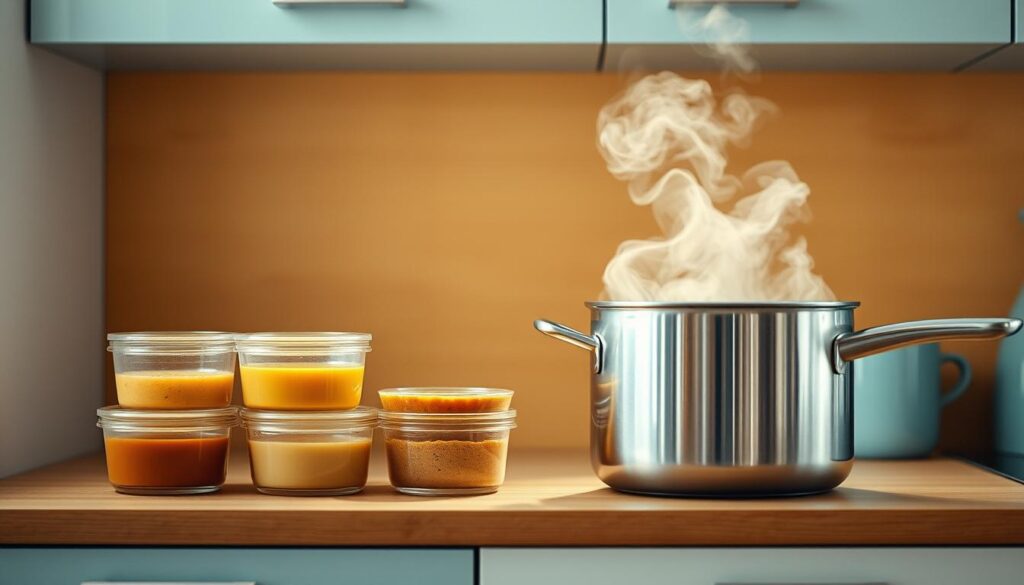
Glass jars with silicone lids work best for beef stews and chunky blends. For broths, try portion-controlled freezer trays. Leave 1-inch headspace to prevent cracking. Label with dates—creamy bases last 2 months, while tomato-based keep 4.
| Storage Method | Best For | Max Freeze Time |
|---|---|---|
| Souper Cubes | Single portions | 3 months |
| Mason Jars | Brothy soups | 2 months |
| Freezer Bags | Bulk batches | 4 months |
Reheating makes or breaks your day. Stovetop wins for texture—simmer gently in a pot with splash of water. Microwave warriors: cover loosely and stir every 90 seconds. Skip the “high” setting—medium power prevents rubbery chicken.
Keep it vibrant:
- Add fresh herbs after thawing
- Stir in yogurt or avocado just before eating
- Freeze garnishes separately (croutons go stale fast)
Last week’s lentil broth tasted better day three—the spices had mingled perfectly. Your future self deserves that same magic.
Utilizing Essential Kitchen Tools for Soup Meal Prep
Your favorite kitchen gadgets might be hiding in plain sight. The right equipment turns marathon cooking sessions into quick wins. Let’s explore how modern tools can elevate your broth game while saving precious minutes.
Pressure Cooker and Slow Cooker Benefits
I tested 12 chicken broth methods before discovering the Our Place Dream Cooker®. Its pressure function extracts deep flavor from bones in 90 minutes—what used to take half a day. Slow cooker mode gently coaxes richness from beef shanks while you tackle laundry.
| Tool | Time Saved | Best For | Flavor Boost |
|---|---|---|---|
| Pressure Cooker | 65% faster | Bone broths | Collagen extraction |
| Slow Cooker | Hands-off prep | Tough cuts | Low-heat melding |
| Combo Unit | Multi-task | Weeknight meals | Layered textures |
Food Processor and Blender Techniques
My Breville Sous Chef turns roasted veggies into silky purees before my pot finishes boiling. For chunky salsas or smooth bisques, adjustable blades let you control texture without extra dishes. Pro tip: Pulse aromatics first—garlic and ginger distribute evenly this way.
Vitamix users know the power move: blend hot ingredients directly in the pitcher. One reader shared, “My curried cauliflower blend went from start to lunch jars in 7 minutes flat.” Pair with freezer trays for instant single servings.
- Immersion blenders prevent splatters when pureeing in the pot
- Food processor shredding disks prep carrots and cabbage in seconds
- High-speed blenders create velvety textures without cream
Smart tools don’t need to break the bank. Start with one multi-tasker like a 6-quart Dutch oven. As your broth skills grow, add specialized gear. Remember: the best gadget is the one you’ll actually use.
Creative Combinations: From Chicken Noodle to Black Bean Soups
Picture opening your lunch container to discover a flavor journey you crafted days ago. Last winter, I tested a base recipe that became two entirely different experiences—a chicken noodle soup with dill-infused broth for Mondays, and a smoky black bean blend with chipotle for Thursdays. The secret? Treat your pot like a flavor lab where tradition and adventure collide.
Start with classics, then twist. My go-to chicken noodle version uses rotisserie leftovers and wide egg noodles, but swapping in spiralized zucchini creates a lighter option. For bean lovers, simmer black beans with cumin and orange zest—it’s like sunshine in a jar. A reader once emailed: “Your smoky version made my office mates ask if I’d brought takeout!”
| Classic | Adventure | Flavor Boost | Dietary Twist |
|---|---|---|---|
| Chicken Noodle | Smoky Black Bean | Toasted garlic oil | Gluten-free noodles |
| Vegetable Beef | Curried Lentil | Coconut milk swirl | Plant-based crumbles |
Layer smartly. Add fresh herbs when reheating, or freeze spice packs separately. One batch can become three meals: bean soup base transforms into chili with added tomatoes, or tortilla-style with avocado slices. My freezer-friendly strategies let you mix textures—keep some ingredients crunchy by storing them apart.
Need inspiration? Try these swaps:
- Swap parsley for cilantro in chicken noodle broth
- Add cocoa powder to black bean blends for depth
- Top vegan versions with pickled onions
Your week deserves variety without chaos. As my sous chef says: “Monday’s comfort food fuels Wednesday’s courage.” What combination will you ladle into jars tonight?
Balancing Classic Flavors: Tomato, Creamy Chicken, and More
Your grandmother’s chicken soup has a new secret ingredient—and it’s not what you’d expect. Last winter, I revamped my mom’s tomato recipe by roasting veggies with smoked paprika. The result? A velvety blend that feels both nostalgic and fresh. Classics become springboards when you tweak one element at a time.
Let’s crack the code on creamy textures. Swap heavy cream for pureed roasted squash or cauliflower in chicken bases. A client once gasped, “This tastes richer than my usual recipe!” For tomato lovers, swirl in basil pesto or top with crumbled feta. The goal? Honor tradition while nudging it forward.
- Add miso paste to chicken broth for umami depth
- Roast garlic with tomatoes to amplify sweetness
- Stir coconut milk into bean soups for dairy-free richness
| Classic Recipe | Modern Twist | Time Saved |
|---|---|---|
| Creamy Tomato | Roasted Tomato & Fennel | 15 mins |
| Chicken Noodle | Turmeric-Ginger Chicken | 20 mins |
| Bean Soup | Chipotle Black Bean | 10 mins |
Pair wisely. Hearty chili loves cornbread croutons, while lighter broths shine with a citrus-kissed salad. Freeze bread slices alongside jars—they’ll toast perfectly while reheating.
Remember: balance isn’t perfection. My Thursday lunch often mixes Monday’s vegetables with Wednesday’s grains. That’s the beauty of prepping classics—they adapt as your week evolves.
Your journey through simmering pots and freezer hacks ends here, but your lunchtime warmth is just beginning. By now, you’ve seen how strategic planning turns hectic nights into grab-and-go victories. Each jar holds more than broth—it’s a promise of comfort that adapts to your busiest days.
Why settle for monotony when variety sits in your freezer? Rotate between smoky black bean blends and herb-kissed chicken broths to keep taste buds curious. One reader told me swapping garnishes daily—a sprinkle of cheese here, toasted seeds there—made her feel like she’d ordered from a new café each afternoon.
Tools matter, but creativity matters more. That trusty Dutch oven and stackable containers? They’re partners in turning Sunday efforts into weekday wins. Try one new combination this week. Share your triumphs with our community—we’re all learning here.
Remember: kitchens hum with experimentation, not perfection. Your next favorite recipe might be a spice swap away. Now, who’s ready to ladle joy into their routine?
Curried Carrot Coconut Lentil Soup
A creamy, spiced soup blending sweet carrots, hearty lentils, and rich coconut milk for a nourishing meal.

Nutrition Information
Equipment Needed
- Large pot
- Blender
- Cutting board
- Knife
Ingredients
-
1 tablespoon olive oil
-
1 medium onion, chopped
-
2 cloves garlic, minced
-
1 tablespoon fresh ginger, grated
-
1 tablespoon curry powder
-
1/2 teaspoon ground cumin
-
1/4 teaspoon cayenne pepper (optional)
-
4 cups carrots, peeled and sliced
-
1 cup red lentils, rinsed
-
4 cups vegetable broth
-
1 can (14 oz) coconut milk
-
Salt and pepper to taste
-
Fresh cilantro for garnish
Instructions
Recipe Video
Curried Carrot Coconut Lentil Soup Recipe
Learn how to make a flavorful curried carrot coconut lentil soup that's perfect for a cozy meal.


